A lot of do’s and don’ts are shelled out to the mother-to-be during the stage of pregnancy regarding her food habits and her fitness. A healthy pregnancy depends to a large extent on the eating habits during this stage. Eating well will help you feel better, keep you energized, help in the desired foetal growth and help you gain a healthy amount of weight.
Eating for two is the most common advice given to a pregnant lady. But the pregnant woman requires just a little more food than a normal lady. And the energy needs increase only in the second and the third trimesters. Gradual weight gain is recommended during the entire pregnancy with the maximum weight gain in the last trimester. Weight gain depends on your height and pre-pregnancy weight. Too much pregnancy weight gain can be difficult to lose after the baby is born. But worrying about that and not taking in sufficient nutrition can also be detrimental to the growth of the fetus. So, seek professional help to determine what would ideally be the right amount of weight gain for a healthy pregnancy.
Here is a list of the important food groups that your baby will benefit from if you include them in your diet. Include them in your pregnancy diet.
Grains
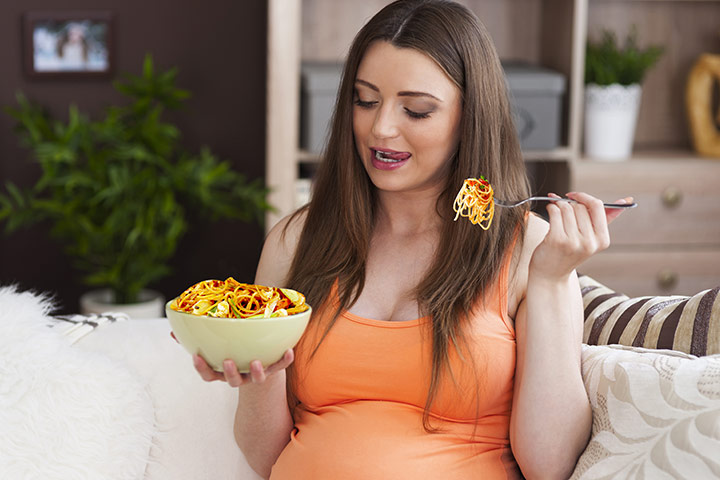
Image Courtesy: www.momjunction.com
Incorporate sufficient whole grains for energy, essential carbohydrates, fiber, iron and B complex vitamins. To maximize the nutrient intake, make sure you use whole grain products like whole wheat bread, chapatis, oats, brown rice, whole wheat pasta, millets, etc. Try and minimize the intake of refined grains in the form of cookies, white bread, pasta and white rice. Always look out for the term whole wheat flour, first in an ingredient list.
Milk And Milk Products
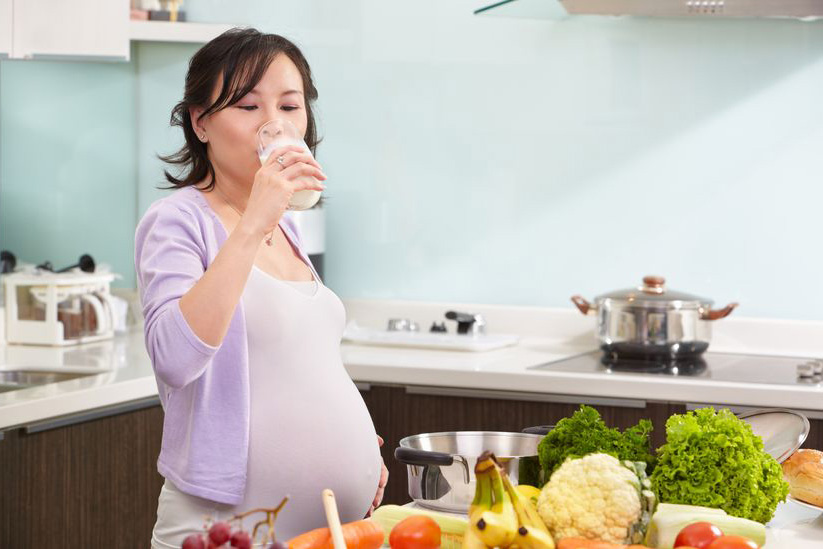
Image Source: esnoticia.co
For the growth of the baby, milk and milk products play an important role. Not only do they provide with good quality protein and calcium for strong bones and teeth but milk fortified with Vitamin D becomes a good source of Vitamin D for bone and teeth health in the diet. However opt for the low fat option. Low fat products provide the same quality nutrients but with less fat and calories.
Meat, Fish, Eggs & Poultry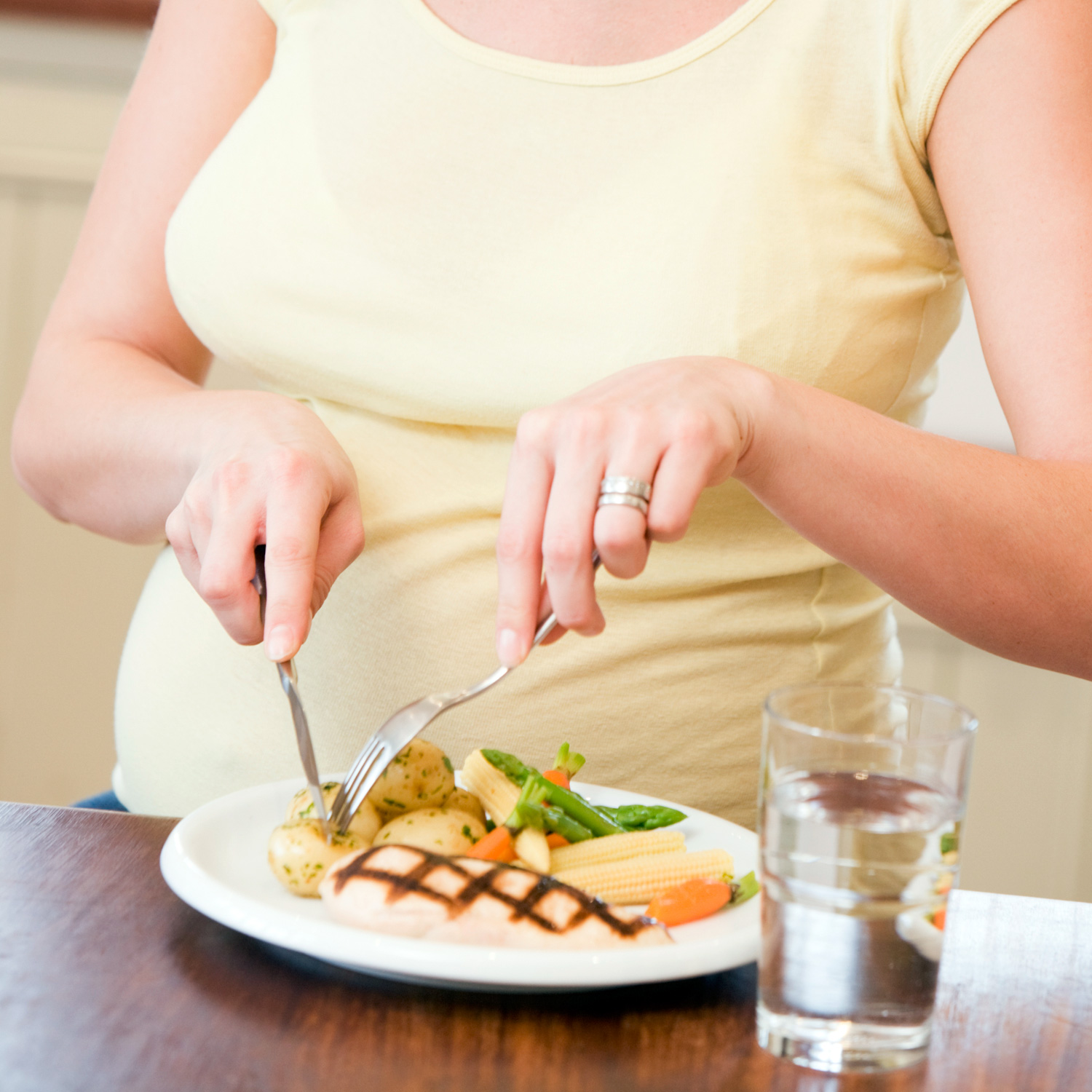
Image Source: www.femside.com
This group provides good quality protein essential for the baby’s growth especially during the second and the third trimester. Choose the lean meats and products. Fish besides providing proteins, are also a good source of the omega 3 fatty acids known to promote the baby’s brain development.
Pulses, Beans, Lentils
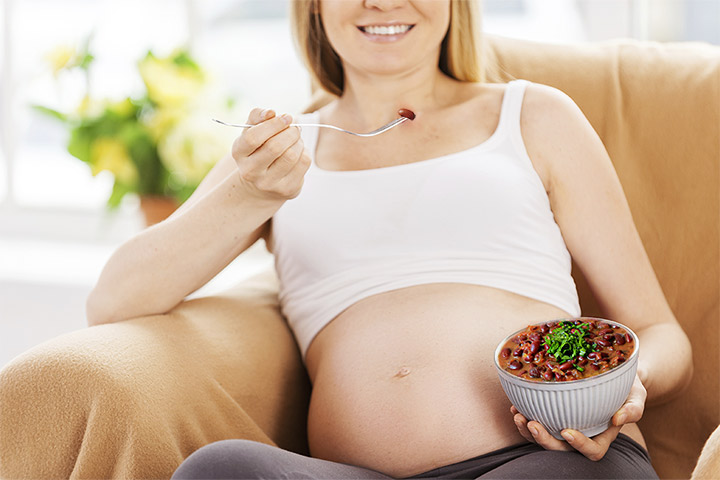
Image Source:www.momjunction.com
Beans, lentils, soy and soy products are good sources of vegetarian protein. Take them in combination with cereals, nuts or milk and milk products to improve on their protein quality. This group also provides with the B complex vitamins and the fiber necessary to combat constipation which is a commonly seen during pregnancy.
Fruits & Vegetables
 Image Source: www.huffingtonpost.ca
Image Source: www.huffingtonpost.ca
A variety of vitamins and minerals and the fiber in fruits and vegetables make it a critical component of a healthy pregnancy. Certain vitamins and minerals are of extra importance during pregnancy:
- Folic acid (B Vitamin) is needed to make new cells and prevent neural tube defects during pregnancy. The neural tube starts to form right after conception. Eat folate rich foods like citrus fruits and juices, dark green leafy vegetables and enriched grain products.
- Vitamin C during pregnancy may reduce your risk of pregnancy induced hypertension and miscarriage. Just adding an extra orange as your afternoon snack or a bell pepper salad will make sure you are taking in the extra Vitamin C required for a healthy pregnancy.
- Calcium is an important mineral for strong bones and teeth. Throughout pregnancy if you do not get enough calcium in your diet, the fetus borrows from the mother’s bones to build the strongest bones for the baby. Mothers to be should be aiming at least for 3 servings of dairy products every day. Low fat milk and milk products like cheese, paneer, yogurt and foods like leafy greens, til, ragi (nachni), small fish with bones are other good sources of calcium.
- Vitamin D works with calcium to help the baby’s bones and teeth. It is also essential for healthy skin and eyesight. Good sources are fortified milk and fatty fish. Exposure to sunlight also converts a chemical in the skin to Vitamin D.
- Iron, necessary for making new red blood cells as the blood volume increases during pregnancy is essential to reduce the incidence of preterm births and low birth weights. Iron from animal sources is better absorbed than from the plant sources. To boost iron absorption pair meats or foods high in Vitamin C with plant sources of iron e.g. pairing moongchilla for breakfast with a glass of orange juice.
- Iodine is necessary for the production of thyroid hormone which is essential for normal brain development in the developing baby. Using iodized salt is the best way to ensure that sufficient iodine is available to the body. Women with a pre-existing thyroid condition should consult a physician for any changes in the thyroid supplement dosage.
Oils & Fats
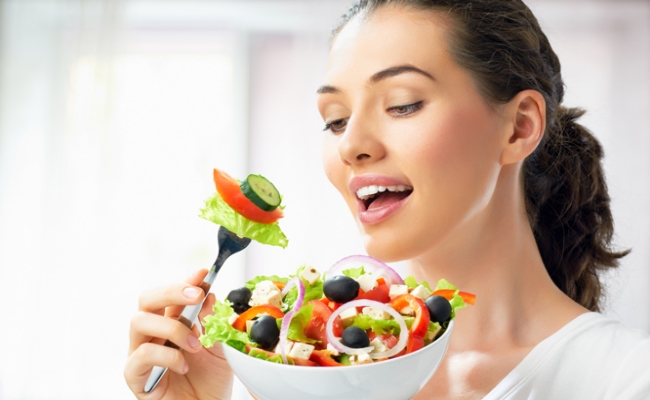
Image Source: www.lifemartini.com
Although they are not a food group, fats and oils are an important part of the diet. During pregnancy the fats that you eat provide energy and help build many fetal organs and the placenta. However, limit the intake of saturated fats like ghee, butter, margarine, cream, coconut oil and choose the monounsaturated and polyunsaturated fats such as rice bran oil, sunflower oil, peanut oil, etc.
What Foods And Drinks Should You Avoid Or Limit
 Image Source: liilandsmilmul.gegahost.net
Image Source: liilandsmilmul.gegahost.net
- Alcohol – not drinking during pregnancy is the safest option.
- Limit intake of foods high in saturated fat such as many biscuits, cakes, pastries, pies, processed meats, commercial burgers and pizzas, fried foods, potato chips and other savory snacks.
- Limit the intake of salt. Choose low sodium options wherever possible. Do not add extra salt to foods.
- Limit the intake of foods and drinks containing added sugar such as soft drinks, fruit drinks, energy and sports drinks.
- Limit the intake of caffeine. Make sure you stay away from energy drinks as they may contain high levels of caffeine.
- Avoid raw eggs and raw or uncooked fish like in sushi.
- Avoid raw, unpasteurized milk and salads at restaurants.
- Avoid raw, uncooked sprouts as they can cause food poisoning.
Above all this exercise can be a healthy part of your routine through your pregnancy. It helps improve the blood circulation and help you get a good night’s sleep. However, work out an exercise schedule with a certified trainer based on your stage of pregnancy and risk factors if present.
Image Courtesy: www.medicaldaily.com




















































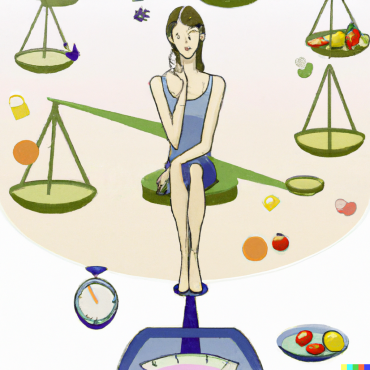




Comments